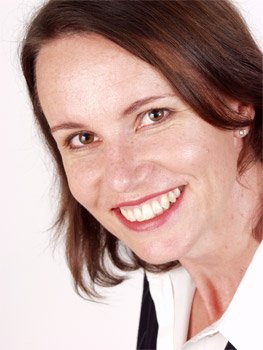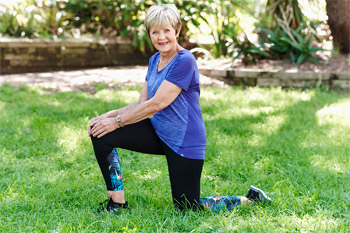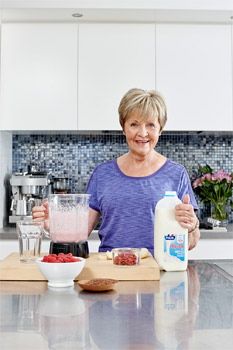Sharon Natoli Boost Bone Health Interview

Sharon Natoli Boost Bone Health Interview
In the quest for good health we often forget about the importance of good bone health, with the desire to get fit and look healthy taking full attention when we consider what constitutes a good diet and exercise regime. However, failing to look after our bone health can have serious consequences, raising the risk of developing conditions such as osteoporosis and increasing the chance of broken bones in later life.
Pauls PhysiCAL Milk makes it easy for you to get the calcium you need, with 40% more calcium than regular milk, plus added vitamin D to aid calcium absorption. In fact, just two glasses of Pauls PhysiCAL gives you 100% of your daily calcium needs. Available in low fat and skim varieties.
Interview with Sharon Natoli, Accredited Practising Dietitian from Food & Nutrition Australia
Question: Can you share with us your five easy ways to boost bone health?
Sharon Natoli: Get up, out and active
Getting up, out and active with weight-bearing exercise is not only good for staying in shape but also helps build bone strength, as your bones have to work harder to support the weight you bear on your feet and legs. Weight bearing exercises include walking, jogging, tennis and dancing. Take advantage of warm weather by starting your day with a brisk walk or light jog. Build exercise time into your commute by getting off the bus a few stops early; go for a walk during your lunchbreak; take on that st eep hill; and climb the stairs. Make it social by exercising with a friend. Step by step, it all helps.
eep hill; and climb the stairs. Make it social by exercising with a friend. Step by step, it all helps.
Make mine a milk!
We all know that calcium is good for the bones, so it's a shock that the average intake of calcium in women is 25-40% lower than recommended1. A few simple additions to your diet can make all the difference, starting with the inclusion of 2 ½ - 4 serves of dairy foods daily. A high calcium milk such as Pauls PhysiCAL can be particularly useful for boosting calcium intake as it provides 100% of your daily calcium needs in two glasses and contains vitamin D to aid calcium absorption. Other dairy foods such as yoghurt and cheese are also rich sources of calcium and easily incorporated into your diet, for example by enjoying yoghurt as a snack or cheese on salads.
Up your vitamin D intake
Vitamin D is essential for calcium absorption however 30-40% of Australians have mild vitamin D deficiency. Along with dairy foods, dietary sources include eggs, fish, fortified cereals and some types of mushrooms so enjoy these foods regularly. However to make sure you reach your daily requirements for vitamin D, ensure you also enjoy safe sun exposure (see below).
Enjoy the sun safely
The best natural source of vitamin D comes from the sun, which is easy to find at this time of the year when we're still enjoying some warm sunny days. Vitamin D aids the body's natural absorption of calcium so moderate and safe sun exposure can contribute toward good bone health. Just make sure that you follow the Cancer Council guidelines.
Go easy on caffeine and alcohol
Caffeine, commonly found in tea and coffee, inhibits the body's absorption of calcium, while excessive alcohol can be directly toxic to bones. Aim to limit your intake of caffeine to up to 2 cups of coffee or 4 cups of tea daily, and limit alcohol to no more than 1-2 standard drinks a day with 2 alcohol free days a week. With both caffeine and alcohol it's key to always enjoy in moderation.
Question: How important are healthy bones to achieving our fitness goals?
Sharon Natoli: Healthy bones are essential to achieving your fitness goals as without strong and healthy bones, your risk of injury increases. If an injury occurs, this can be a significant barrier to achieving your fitness goals as your training regime becomes interrupted and it can potentially have longer term consequences in relation to your ability to perform certain types of exercises.
Question: Do you have a recipe to share, for a post-workout snack high in calcium?
Sharon Natoli: The Get Up and Goji Gym Smoothie is a great post-workout snack as it is high in protein for muscle growth and repair, high in calcium for building strong bones and provides carbohydrate for replenishing energy stores.
 Question: How does osteoporosis affect Australians?
Question: How does osteoporosis affect Australians?
Sharon Natoli: Osteoporosis is a common condition affecting 1.2million Australians with 6.3million identified as having low bone mineral density, a key risk factor for the development of osteoporosis. People living with osteoporosis are at increased risk of fractures. Even a minor bump or fall can lead to a bone fracture which in turn has a significant impact on a persons quality of life.
Question: How can we prevent conditions such as osteoporosis?
Sharon Natoli: There are a number of key lifestyle factors that reduce the risk of developing conditions such as osteoporosis. It is important to make sure you get enough calcium and vitamin D from the foods you eat daily, along with including regular exercise – in particular weight bearing exercise like brisk walking, tennis or weights. It's also important not to smoke and to avoid drinking too much alcohol. To reach your daily calcium intake, aim to include around 3 serves of dairy foods daily such as milk, cheese or yoghurt, or high calcium alternatives. A high calcium milk that also provides vitamin D, such as Pauls PhysiCAL, makes it easier to meet daily calcium needs as it contains around 40% more calcium than standard milk.
Question: How do weight-bearing exercises help protect our bones, in the long run?
Interview by Brooke Hunter
MORE



